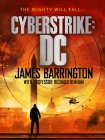Cyberstrike, James Barrington [short story to read .TXT] 📗

- Author: James Barrington
Book online «Cyberstrike, James Barrington [short story to read .TXT] 📗». Author James Barrington
But whatever the truth about this elusive figure, the previous day the coalition forces surrounding the isolated ISI – Islamic State of Iraq – safe house about six miles outside Tikrit had received solid intelligence that stated the man – or a man the informant had claimed to be Abū Omar al-Baghdadi, which wasn’t precisely the same thing – was somewhere inside the building. And the chance of either killing him or laying his ghost to rest was too good to miss.
Attacking a compound comprising a large house inside a stone boundary wall, a house that was known to be occupied by heavily armed ISI fighters, was a potential recipe for suicide, so the American and Iraqi soldiers surrounding the building weren’t going to just amble over and knock on the door. Or even strafe it with machine-gun fire. They had an entirely different plan in place.
The two senior officers of the coalition force were lying side by side under cover just over two hundred yards away, studying the building through binoculars.
The word ‘desert’ reached the English language – late Middle English, to be precise – either from the French word deserter, which was itself derived from desertare in late Latin and originally from desertus, or possibly direct from the ecclesiastical Latin dēsertum, a participle of the verb dēserere, meaning ‘to abandon’. Originally, the word meant ‘an abandoned place’ in the sense that it was not occupied by people, hence ‘deserted’, but over the last century or so it has acquired its present meaning: an arid and usually sandy expanse of land.
And that was precisely what the two military officers, and all the soldiers under their command, were looking at. The terrain in front of their position was virtually devoid of vegetation, just the occasional stunted tree or bush that was somehow clinging on to life in the harsh environment. The ground was a mixture of sand and rock, the latter fortunately providing numerous places where the soldiers had been able to conceal themselves before the attack commenced, and which would provide a bare minimum of cover when they began their advance.
Beyond that area of largely level ground a large solid stone house, flat roofed and with small windows and two wooden doors visible from the vantage point chosen by the officers, sat inside a stone boundary wall about five feet high which entirely enclosed it. There were at least two gates that pierced the wall but the coalition troops had no intention of using them until most of the resistance had been suppressed. The stone of the building and the wall were the same whitish-grey colour as the rocky outcrops in the vicinity, and no doubt the building had originally been constructed from stones cut from the bedrock in that area. It looked completely solid and was by any sensible definition a hard target, which was why the coalition force was waiting for one particular event to take place.
About five feet behind the two officers, one of the US Army soldiers was listening to transmissions on his SINCGARS combat net radio, waiting for a specific report. He was a JTAC, a Joint Terminal Attack Controller. That meant he was authorised to control combat aircraft being used in close air support in battle, effectively using the aircraft as a lethal addition to the weapons he already had to hand. He’d already provided the ‘talk on’ to the pilot to precisely identify both the target and the weapons to be used. Now he was just waiting for one thing.
He stiffened as he listened to a message, then leaned forward very slightly and in a voice that was little more than a loud whisper said a single word.
‘Inbound.’
The American captain glanced at his Iraqi Army opposite number, who nodded. Then he turned back to face the soldier.
‘Clear it,’ he said.
‘Roger, sir.’ The soldier pressed the transmit key and spoke quietly into his microphone. ‘Boar Three One, you’re cleared hot. I say again, you’re cleared hot.’
He listened to the reply, then spoke again to the officer.
‘Ninety seconds, sir.’
‘Good. Pass it on.’
The soldier nodded and spoke just as quietly into the second radio he carried, the AN/PRC-148 MBITR handheld unit. All the soldiers in the combined force carried identical sets.
A minute later they all heard it.
The AGM-65 Maverick air-to-surface missile is just subsonic, travelling at 0.93 Mach or 713 miles per hour, which meant they saw it at virtually the same instant that they heard it. There was a deafening roar from the Thiokol solid propellant rocket motor as the stubby white missile streaked over their heads and smashed into the side wall of the target property. The impact was followed instantly by the shattering explosion as the WDU-20/B shaped-charge detonated.
Lost in the sound of the explosion, they didn’t hear the roar as the second Maverick overflew them, but there was no mistaking the sight and sound of the missile hitting the target about a dozen feet to the right of the first impact.
But that, really, was only the prologue, the hors d’oeuvre that preceded the main course.
With a sound like some kind of massive fabric being torn apart, a steam of 30mm high-explosive shells screamed over the dusty ground at around half a mile a second to smash into the wall of the building, detonating in bursts of yellow flame accompanied by a noise like constant rolling thunder as the charges exploded. Windows blew inwards and stones shattered or simply disintegrated, shards flying in all directions.
An instant later, what looked like an old-fashioned light-grey aircraft with straight wings swept over the ground troops, its twin tail-mounted General Electric turbofan engines emitting a deafening scream. The nose of the





Comments (0)